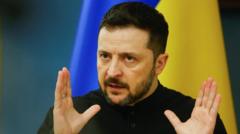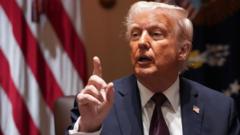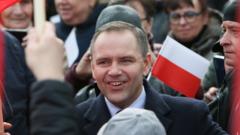In a recent meeting in Paris, President Zelensky expressed optimism about Ukraine's security prospects while acknowledging European struggles to guarantee support amidst changing U.S. alliances. His buoyant mood contrasted with earlier tensions from his White House visit as he seeks stronger commitments from allies.
Zelensky's Optimism Amidst European Security Uncertainties

Zelensky's Optimism Amidst European Security Uncertainties
President Zelensky remains hopeful for Ukraine's future as European leaders work on security guarantees, despite previous setbacks with the U.S. administration.
President Volodymyr Zelensky left a recent meeting in Paris, where he gathered with 30 European leaders, feeling optimistic about the potential for security guarantees for Ukraine amidst ongoing tensions with Russia. His visit came just after a tête-à-tête dinner with French President Emmanuel Macron, who had warmly welcomed him and lit up the Eiffel Tower in the colors of the Ukrainian flag.
Zelensky’s positive reception in Paris starkly contrasts with his previous visit to the U.S. White House, where he faced criticism from President Trump and others, which led to a temporary suspension of military aid to Ukraine. Following that setback, Zelensky adeptly navigated the political waters, repairing his relationship with American officials, as he demonstrated a willingness to compromise on conditions for a ceasefire.
During the Paris gathering, European leaders and diplomats collaborated on the "coalition of the willing," aiming to bolster Ukraine's security following a potential long-term ceasefire. Despite the renewed cooperation, there remains a palpable unease about the reliability of American support, a sentiment voiced by both Zelensky and European officials.
Zelensky praised initiatives from European nations, particularly the U.K., France, and Germany, aiming to enhance their defense spending. He optimistically projected that Europe might catch up with U.S. military capabilities within a few years, although this view is deemed overly hopeful by some analysts.
On the topic of Russia's demands tied to ceasefire negotiations, Zelensky emphasized the need for the U.S. to remain firm and resist yielding to Russian conditions, such as reinstating a Russian bank into the SWIFT international payment system. He reiterated the resilience of Ukraine and expressed hope that American leadership would reflect their steadfast dedication to their Ukrainian allies.
In a pointed critique, he reacted to comments made by U.S. envoy Steve Witkoff, who downplayed the Coalition’s efforts as mere posturing. Zelensky argued that such perspectives reflect an acceptance of Russian narratives and emphasized his gratitude for U.S. support while cautioning against misinterpreting the complex geopolitical landscape.
Despite the immense pressure he faces, Zelensky remains focused on securing a safe future for his children and his nation. He reflects on his legacy, distancing himself from Putin’s actions, while he declares his commitment to defend Ukraine against its aggressors. Amidst these turbulent times, both leaders are fully aware that their futures, and potentially personal legacies, are intertwined within the ongoing conflict. As discussions continue, Zelensky is aiming for a deeply engaged international stance to foster lasting security for Ukraine while navigating the political complexities of European and American relations.






















